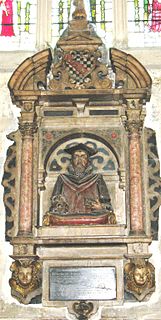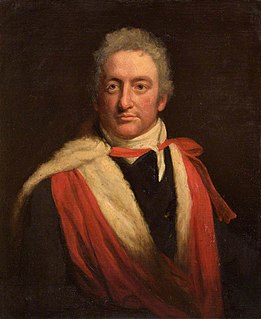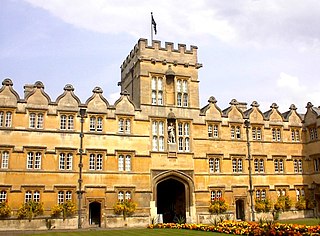
Sir John Leach, KC was an English judge, and Master of the Rolls.

John Covel was a clergyman and scientist who became Master of Christ's College, Cambridge and vice-chancellor of the University.
Sir Richard Richards SL was a Welsh politician and judge. He was Member of Parliament for Helston on two occasions, but only made one speech in Parliament. He was later a successful chancery barrister, eventually becoming Lord Chief Baron of the Exchequer.
William Holmes D.D. was an English academic, Vice-Chancellor and Regius Professor of Modern History of the University of Oxford. He was also Dean of Exeter between 1742 and 1748.
William Lancaster D.D. (1650–1717) was an English churchman and academic, Provost of The Queen's College, Oxford.

John Gostlin or GostlynMD was an English academic and physician, Master of Gonville and Caius College, Cambridge from 1619 and Regius Professor of Physic.
Francis Babington D.D. was an English divine and an academic administrator at the University of Oxford. He was elected Master (head) of Balliol College, Oxford on 2 September 1559, a post he held until he resigned the following year on 27 October 1560. Babington was Vice-Chancellor of Oxford University from 1560 to 1562. He was also Rector of Lincoln College, Oxford from 1560 until he resigned in 1563.
The Revd Theophilus Leigh, D.D. was an 18th-century Oxford academic of aristocratic descent.
John Baron D.D. was an English academic administrator at the University of Oxford.
Robert Shippen D.D. FRS (1675–1745) was an English academic administrator at the University of Oxford.

Robert Hovenden D.D. (1544–1614) was an English academic administrator at the University of Oxford.
An election for the Chancellorship of the University of Cambridge was held in November 1950 after the death of the incumbent Chancellor, Jan Smuts. There was a contested election as the University establishment's candidate, Lord Tedder, was opposed by a group of Dons who favoured Jawaharlal Nehru. Nehru was nominated without giving him an opportunity to withdraw, and although honoured by the nomination, felt he could be of no service to the University. Although Nehru eventually persuaded his supporters to withdraw his name, a nominal election was required and took place on Friday 10 November, Tedder being declared the winner but without disclosing the number of votes cast.

An election for the Chancellorship of the University of Cambridge was held on 25–27 February 1847, after the death of the Duke of Northumberland. Many senior figures in the university hoped that Prince Albert, the Prince Consort could be persuaded to stand and be elected unopposed, but a group from St John's College approached the Earl of Powis, a St John's man. The election became politicised as Powis was a noted Conservative and his opponents feared the consequences from the Whig Government if he was elected. The result was close as the large number of non-resident Members of the Senate from St John's, and Conservative supporters, backed Powis, but the Prince was elected and agreed to take up the post. The election occurred at a critical point in the history of the University when it was pressed to reform, and the Prince Consort's election allowed progress to be made.
William George was an English churchman and academic, Provost of King's College, Cambridge from 1743 and Dean of Lincoln from 1748.

William Richardson (1698–1775) was an English academic and antiquary, Master of Emmanuel College, Cambridge from 1736.

Martin Davy (1763–1839) was an English physician and academic, Master of Caius College, Cambridge from 1803. In later life he was also a cleric.
John Copcot, DD was an English cleric and academic, becoming Vice-Chancellor of the University of Cambridge and Master of Corpus Christi College, Cambridge.








